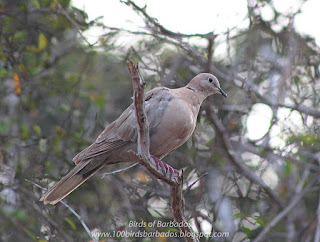 |
| The nesting pair of Eurasian Collared-Doves |
In less than a month of the fledglings leaving the nest,
the Eurasian Collared-Doves (Streptopelia
decaocto) outside my bedroom window are nesting again. I
always wondered how these birds were able to multiply in an area at such an
alarming rate, and now I can see why. No wonder we can see hundreds
on power lines and trees across the island.
 |
| Doves examining the nest |
I first noticed the couple hanging around their old nest, even
smooching and other lovey dovie things in it, but then they stayed
away for a few days. When they did return it was nesting time with a nesting
routine like what was described in the last post about them (read it here) . On Friday, May 15, I notice two white eggs in the
nest and the parents going through the routine of the evening exchange of
incubation duties but at some times the nest was left alone, something I never
noticed in the first nesting.
 |
| The nest with two eggs |
The nest looked in bad shape, even for a dove’s nest. These
two love birds did nothing to fix it up for the new brood of chicks. I
must admit I thought that this was a new pair of collared doves making use of a
vacant nest, but that doubt was laid to rest this afternoon. As the parents
were in the process of exchanging nesting duties, both juveniles followed the
parent bird to the nest. It was a sight to see as the two harassed the
parent, that was leaving the nest, for food. Yes, the juvenile birds were still being fed
regurgitated food from the parents who were in the process of having more
chicks. Sadly I did not have my camera to capture the moment but I am
itching to see what will happen once the new chicks hatch. Will the crop
milk be available for the new chicks? Will it be adequate and of a quality to
produce healthy chicks? will the parents feed all four chicks, if both eggs
survive? So many questions!
I can see why the population of these birds is increasing so
rapidly, these guys breed like mice! That for sure is not good news for our
native species.




No comments:
Post a Comment